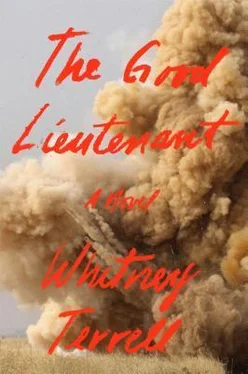The real shocker, though, was seeing the target in reality: a shirtless, hobo-type figure in an oversize blue jacket, his front lip lifted rabbitlike over a pair of jutting teeth. He shifted in and out of focus as the Humvee bounded across the furrows of the field like a buoy out at sea — but his presence, at least to Crawford and McWilliams, seemed to change everything, to be like an electric charge, amplifying and overriding reality. “Get down, motherfucker! Get down!” Crawford was shouting. “Wave at the motherfucker, Mickey. Come on, you shithead. Please!” But each time the prow of the Humvee nosed down, there he would be again, like some kind of drifter or clown, flapping his arms at them, waving them away, his urgency mimicking Crawford’s urgency, the whole thing tightening up in what seemed like a bad way. Pulowski had wanted there to be a target, he supposed. At least that would prove his case. But now, seeing the target live, he found himself wishing that the Iraqi would escape. He wished desperately to warn him, had to literally cover his mouth to prevent himself from screaming, Watch out! Watch out! We’re coming! You have to—
* * *
The screaming voice Pulowski heard when he woke up was high-pitched, piercing, but he couldn’t figure out where it was coming from. It definitely wasn’t Crawford, who was leaning forward in the driver’s seat, his body suspended against the thickly woven strap of his shoulder belt, as if he’d been trying to lunge out his side door. He had light, walnut-colored skin and pale olive eyes, and what Pulowski saw in his expression, when he pulled Crawford’s body back toward him, wasn’t blame or even anger but some sort of outraged plea for sympathy: You see what I’m doing? Isn’t this ridiculous? I can’t believe you caught me doing such a stupid thing! and then when Pulowski propped himself up on an elbow, and he saw that the dash, the steering column, and the heavy metal cabin that held the vehicle’s electronics had swallowed up Crawford’s legs and that behind him McWilliams, the gunner, had no right ear or cheek and the blood from the dark hole that had replaced them was currently staining his pants at the knee. For a moment, Pulowski gathered himself and tried to push himself free, his thighs flexing, but his left leg was pinned and a bright current of pain flared up his thigh, and then finally he quit screaming and lay back into the quiet wilderness of the front seat.
“You think you can get out?” he said to Crawford. The door on Crawford’s side was missing.
Crawford clenched his jaw so tightly that the ridged skin of his lips disappeared and his mouth seemed only a nubby seam. The gold-framed glasses that he wore beneath his goggles had fractured and swiveled down along his cheek and he thrashed against the shoulder belt, lunging toward the open door, and the field beyond, in a way that reminded Pulowski of a fish flopping on dirt, or on a parking lot, on some completely foreign piece of asphalt, the water miles and miles away.
“Okay, I get it, I get it. Chill out for a second.” Pulowski tried to open the door on his side of the Humvee but it wouldn’t budge. He couldn’t crawl over Crawford to get out. So finally he jabbed at the broken windshield, clearing away bits of glass as best he could with what appeared to have once been an air-conditioning vent, then stared out over the exploded engine, the axle, the soft, four-foot-deep hole where the bomb had been. Beyond it, he saw the Iraqi who’d waved at them. He was maybe twenty yards off and lay facedown in the dirt, his feet toward Pulowski, as if he’d been spun around by the shock wave. He was alive — that Pulowski could clearly see. He was crawling on his belly, moving with a painful, almost ridiculous slowness, his jacket covered with chaff and one of his legs folded sideways over the other at a wrong angle, like an insect’s. “Hey!” Pulowski shouted. “Somebody! There’s a guy here moving. He’s still alive! He’s trying to go someplace!” Then Pulowski heard the crunching sound of boots running across a chaff-strewn field and, at the same moment, saw Fowler approaching with an M4 at her shoulder. “Get down! Get down!” she shouted. And then, in a different tone, “Stop! Stop! Stop moving now!” Her face was familiar beneath her helmet, flushed, darkly tan, the blond-brown wisps of her hair plastered all around, then fading out pale into the curve of her cheek, but her expression was all wrong, blunt and explicit, terrifying in its intensity. “No,” he said. “Wait!” He raised his arms. “Down!” she shouted, and then he huddled quickly behind the ruined dashboard of the Humvee and he heard a flat burst of fire, and when he sat up again, the Iraqi had rolled over onto his side and curled up, as if he’d decided to go to sleep.
Pulowski definitely recognized his face.
* * *
When Fowler wrenched open the Humvee’s door, Pulowski struck at her, knocking her hands away, as if he had a train to catch. Fowler did not particularly care. He was alive. That was the cure for the black cape of badness that was swarming around the back of her head. “Settle! Settle!” she said, grabbing him, her thumbs on either side of his sweating nose, fingers curled around his cheeks. “Everything’s gonna be okay.”
“What the hell are you doing?” he said.
“Where’s Crawford?” She was craning her neck, trying to see inside the cab.
“Crawford,” Pulowski bleated. “He’s bad.”
She ran around the Humvee. Crawford’s body was leaning halfway out of the cab, at an angle that seemed impossible not to be causing him pain, and she lifted him back into the seat. He was dead. Standing up, she saw that two of Masterson’s soldiers were working slowly back the way they’d come, away from them, out of the field. In the other direction was a rough half circle composed of the vehicles from her platoon: Waldorf’s Humvee over by the edge of the field, then Jimenez’s, then the Hercules, which also had been hit and had thrown a track but was not on fire. Eggleston, the driver, was pulling Halt, the gunner, from his turret, and Halt, just based on body language, was not injured seriously. “Sergeant, my radio’s out here,” she shouted. “Can you communicate?” And when Eggleston gave the thumbs-up, she ordered, “You’re going to have to run comms for me. Call the TOC, make sure we’ve got medevac. Call Waldorf on the other side. Follow your own tracks back out. Do you got me?”
So, good: there was that. All this time she was avoiding the sight of the Iraqi’s body. The one she’d just shot. It was on Pulowski’s side of the Humvee, in the no-man’s-land between the Hercules and Masterson’s soldiers, and she kept her eyes averted so she wouldn’t see the dead Iraqi’s face. Instead, she checked on McWilliams — dead — dug out the Humvee’s med kit, and circled back to Pulowski, who was shaking his hands loosely in front of his chest, and pried open his ruined door. “You’re okay,” she said, opening the kit. “It’s going to be okay. You couldn’t have known what the guy was going to do. It’s not your fault, Dix. You can’t—”
“Not my fault!” Pulowski hissed.
And now, here, she was granted full, unfettered access to his pale eyes, his direct gaze. She’d made love to him like this, this close, her fingers running over the pores of his skin, his beaky nose, the acne that sometimes rose up around his eyebrows — and her favorite spot, the soft skin beneath his ear, leading down to his boy’s neck.
“Do you want it to be? I could think something up.”
It all checked out. No spinal damage. Nothing destroyed, except for down below, where the Humvee’s dash bit down on his legs. “Try me,” Pulowski said.
“You could’ve sat in back.”
Читать дальше












